The Sunderland, England hotshot and Sheffield Wednesday promotion hero who ‘never fit in’ and walked away from football aged 23
and live on Freeview channel 276
The first thought is that Patrick Collins doesn’t look much like we expected him to before we’d exchanged messages in the lead up to the call a week or so earlier.
He’s one of the former Sheffield Wednesday players we’ve long since had on a list of blokes we’d like to track down for an interview and the call is the end result of a few messages to long-since abandoned email addresses and the odd request for information from ex-teammates.
Advertisement
Hide AdAdvertisement
Hide AdWe tried messaging an old Wordpress website he’d put together in the months after his retirement from football aged just 23. We’d tried messaging a long-extinct account on Wednesday fan forum OwlsTalk. A couple of years back Collins’ old Owls boss Chris Turner chuckled when asked if he knew what became of him. He seemed to be something of a mystery.
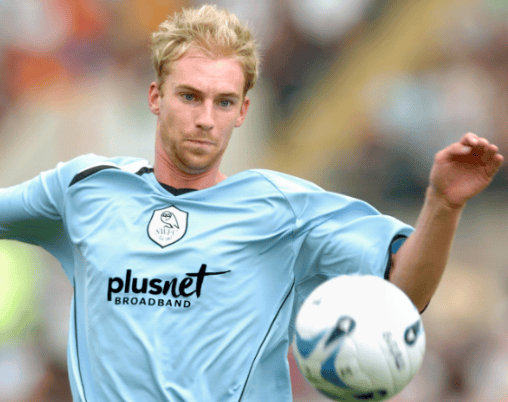

In the end, we found him on LinkedIn. Collins, in the football world at least, is something of a rarity. If they’re not in coaching, media work or still bouncing round the grounds, someone will always know what an ex-player is up to ‘these days’. But in the football world, Collins is entirely off-grid.
It is in the business world that he is now a high performer that exhibits the sort of hard work and efficiency that saw him captain Wayne Rooney and feature as the ‘other sub’ in Wednesday’s iconic 2005 League One play-off final win in Cardiff.
The flash of highlighted hair is gone. He’s smartly-dressed and is speaking from his office in sunny Lithuania. He comes across articulate and cerebral and in a soft North East accent he speaks of football entirely in the past tense, describing it as a world he enjoyed, but in which he never truly fit in with the crowd around him. It was a feeling of unease.
Advertisement
Hide AdAdvertisement
Hide AdHere’s how The Star spent an hour with Sunderland starlet and Sheffield Wednesday promotion hero Patrick Collins.
*****
“I wasn’t very good,” Collins says with no hint of false modesty when asked of his start-out in football.
“I came into football differently to most people and came out of football differently to most people. I grew up as a sprinter. My brother was an Olympic-level 400m hurdler. That’s what I grew up doing; hurdles, sprinting, athletics really.”
A middle-class kid from Jesmond - the place now known as a student enclave where a lot of Newcastle United footballers live - Patrick Collins is the son of a languages teacher and an engineer who attended the Royal Grammar School Newcastle. A cursory glance down its Wikipedia alumni shows high-ranking politicians, scientists and academics.
Advertisement
Hide AdAdvertisement
Hide AdThere are sports stars; a couple of single-figure cap rugby union internationals, a couple of first-class cricketers. Fraser Forster was a couple of years below him. But it’s clear it was a schooling more reared towards academia than producing a rich history of sporting superstars.
All that said, there was no silver spoon in Collins’ mouth and his parents had to work hard to place him in one of the most respected schools in the North East. But it’s fair to say his was not the gritty, working class upbringing more stereotypically associated with footballers. He spoke well and did his homework. He read. He enjoyed his study.
For many years, football had been a long way down his teenage priority list and while tossing around a number of options when out of nowhere professional clubs came calling, he chose Sunderland on the basis they were the only club that would allow him to continue studying for his A-Levels.
“All the other clubs would only take me if I didn’t continue my education and that just wasn’t me,” he said. “My upbringing was quite academic, I went to a good school, had really good GCSEs and got good A-Levels. Football was never on my radar and all of a sudden I was a professional footballer. Suddenly that was my career and it took me a long time to figure out what was going on. I always liked football but I was never a hardcore fan. I just thought I’d give it a go.
Advertisement
Hide AdAdvertisement
Hide Ad“Football for me was just playing Sunday league from the age of nine or 10, it’s what you do in the North East, and I was pretty much hopeless until I was about 14. Before that I was just running around.
“All of a sudden I was going to trials at clubs, county trials and all that.Within like six months I went from getting onto the county team to signing a professional deal at 16 years old. And six months after that I was in the England youth team. It was a mix of being really, really fit and suddenly getting a bit of composure and working the game out a little bit. It was crazy. I’d never, ever thought of football being an option.
“What the teams liked was that I had the physical attributes of a player, but I didn’t have the academy habits. Some lads sign from five to 15 and they’re not raw, they are bred into a technical style of play. I was a little bit different and scouts liked it. There were lads getting released at 15 or 16 that had been at clubs from five years old and I sort of waltzed in and signed a deal.”
The England youth teams he was a part of - and would occasionally captain - featured the likes of Wayne Rooney, James Milner, Gary Cahill and Scott Carson.
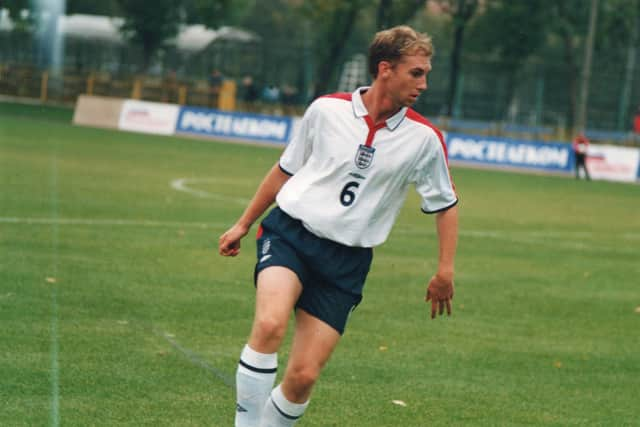

Advertisement
Hide AdAdvertisement
Hide AdIt is Wayne Routledge he remembers being the stand-out in a team that would routinely dominate teams in possession to the point that he recalls a feeling of boredom creeping in while playing as a defender - though admittedly not so much when lining up against Cristiano Ronaldo on debut. England drew 1-1 with Portugal and Collins scored their goal.
He’d train with the Sunderland first team as a teenager just months into his time as a footballer, bashed around by Niall Quinn and Kevin Phillips and given the occasional runaround by Julio Arca. He’d make the bench for the Black Cats. It had been a manic and unexpected rise through the ranks for the Newcastle-supporting sprinter.
But it was in these early days Collins became aware of a back-of-the-mind unease of feeling a little different to those around him. His Sunderland youth coach reprimanded him for not integrating with his teammates socially and his teammates would, as he puts it, ‘give him sh*t’.
His voice drops a touch in tone as he remembers a time of highs and lows.
Advertisement
Hide AdAdvertisement
Hide Ad“I wouldn’t say I was posh, but I was posh compared to somebody who maybe didn’t have my academic background,” he said. “I stood out a mile, the way I spoke and the way I carried myself. Generally, up there, if you went to a private school you stood out. I stood out like a sore thumb - and not in a good way.
“At 16 you’re always pretty insecure within yourself anyway without all these young lads giving you sh*t, basically. I had to be pretty independent to get going and my goal was about ‘OK if I’m going to do this, how do I become the best I can be?’ I wasn’t that sociable mostly because I wanted to be the best I could possibly be. As a teenager I just didn’t fit in. It was a feeling that never really left me to be honest.”
*****
The moment that changed the 2005 League One play-off final in Sheffield Wednesday’s favour is immortalised on YouTube. Trailing 2-1 to Hartlepool United, Paul Sturrock had turned to his bench for possible answers and settled on three. With the backdrop of the blue and white masses watching nervously at the Millennium Stadium, three men stripped off their training kit and rose from the dugout.
The clock showed 77 minutes and two of the oncoming subs were obvious. Steven MacLean was Wednesday’s top scorer and had only recently overcome an injury that had seen him miss nearly three months of action. Drew Talbot was a quick, spritely attacker who had scored goals from the bench earlier in the campaign.
The other was Patrick Collins.
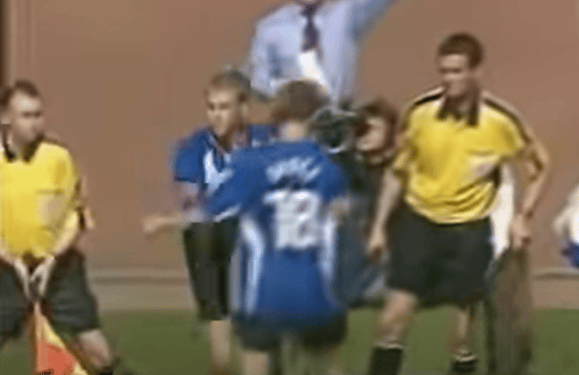

Advertisement
Hide AdAdvertisement
Hide AdHe too had only overcome injury that saw him cruelly miss out on involvement in the semi-finals. It wasn’t widely known at the time, but a bruised rib had seen him taken out of the side for the double-header with Brentford. He’d come on for Alex Bruce.
It was an unusual turn of events that had made him a Wednesday player less than a year earlier that started with an unexpected call to his office by Sunderland manager Mick McCarthy.
“I sat down thinking I was in trouble or that he was going to tell me certain things I needed to do to improve my game and break into the first team,” Collins said with a wry smile. “He told me he wasn’t going to extend my contract and I would be released.
“I told him ‘I’ve got a five-year deal!’ He didn’t know, he was calling round the club and it obviously turned out I was right. It came as a surprise to be honest and it obviously set off alarm bells.”
Advertisement
Hide AdAdvertisement
Hide AdThe message - deliberately or not - was that he had no future at Sunderland and off the back of the McCarthy mishap, via the PFA, Collins took the club to a tribunal. He was awarded two years wages, free agency status and at the age of 19 set about finding a new club.
He’d trial with Birmingham City and Celtic before Chris Turner and Sheffield Wednesday came knocking to welcome the teenager into a vast squad rebuild.
He’d trial alongside Chris Brunt, another young player reared in the North East, and signed all too aware of the size and potential the Owls had despite their third tier status. Martin O’Neill had liked him at Celtic and he’d performed well in trialling up against Aiden McGeady.
But Wednesday offered a clear route into first team football Celtic couldn’t offer and such was Collins’ mentality, his decision was made.
Advertisement
Hide AdAdvertisement
Hide AdHe made his debut in a chastening 3-0 opening day defeat at home to Colchester United. What soon became clear was that England caps and training battles with Niall Quinn had simply not adequately prepared Collins for the experience of playing football in front of nearly 25,000 expectant Wednesdayites.
“The adrenaline was literally too much for my body,” he remembered. “The night of my first game I had to go to hospital. We were beaten by Colchester, there was the emotional stuff attached to that disappointment, it was so hot and I ran so much. I just remember the adrenaline and the noise. I went home, I went to the toilet and what came out of me was just green. I rang the physio at 10 o’clock at night. At hospital they told me I was just severely dehydrated. My body just said it was too much.”
A few weeks earlier, Collins remembers that slight feeling of ‘outsiderism’ making itself apparent once again. He uses three words to describe his first impression of an Owls changing room of the time that included the big, gnarled personalities of Lee Bullen, Chris Marsden, Paul Heckingbottom et al; ‘experienced, mature, worldly’.
His teammates were generous and friendly in their welcoming of him, he said, but the rough-and-tumble of a football changing room was somewhere he felt not entirely at ease.
Advertisement
Hide AdAdvertisement
Hide AdA now famous pre-season tour to Ibiza saw Turner’s newly-thrown together squad enjoy more drinking sessions than training sessions. Collins remembers filling his time with his roommate Brunt while most of the boozing was taking place in the hotel bar and beyond. Looking back and with the benefit of life experience now behind him, he wishes he’d got more involved.
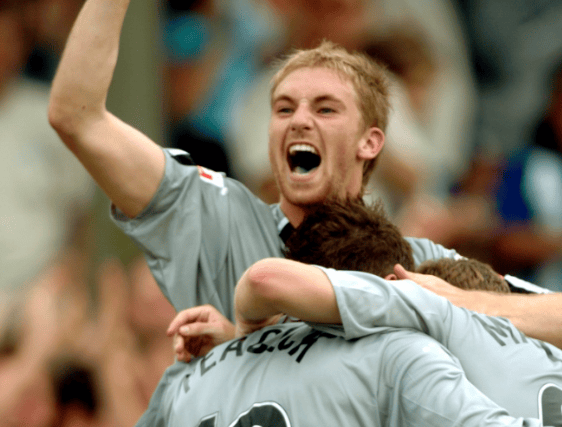

“I was always too naive to understand it,” he said. “I never had the experience of university, drinking and all that stuff. I never got into the drinking culture, I didn’t really understand it. In Ibiza I remember there was me and Chris Brunt sharing a room, just reading books and watching films. I didn’t want to get dropped for having a night out and it wasn’t until after that I learned most of the team were there - and the manager was there!
“Actually, it would have been something I could have used to build better bonds. I was never part of that culture. Looking back, I could have loosened up a bit and taken more risks. That’s where you build some of these bonds. The fact that we even went to somewhere like Ibiza for a pre-season training camp was a bit crazy to me!
“I was a fairly introverted, academic person living in an environment that was highly-extroverted and non-academic. I think nowadays it might be different, maybe I would channel some energy into Instagram and take the opportunity to use that platform, maybe to grow a brand. At the time, none of that was out.
Advertisement
Hide AdAdvertisement
Hide Ad“It’s quite an insular life. You train with the team, you have such amazing supporters but there’s a divide between the players and supporters. I do wish I’d had an ability to connect with the supporters more and I had got to know more people. I didn’t know many people in Sheffield, I had a girlfriend at the time, I knew the players and that was it.
“What I found so tricky was that if you have a good game, you chill out and move on. If you don’t have a good game it’s very hard to relax. You don’t necessarily speak about these things with the team, although you’re a team and you’re aiming for the same things, you’re also a set of professionals looking after your own career.
“There was always a camaraderie but I always felt it was hard to make deep, deep friends. There were groups that were good friends, not cliques, but different personalities that would gravitate towards one another.
“I never fit in with any football team, basically. Maybe the other players could tell you why, but I never found someone I truly clicked with. I had some friends in the England squad but within the teams I had people I got on with but never really felt like it was a home, being a footballer.”
Advertisement
Hide AdAdvertisement
Hide AdCollins played 33 times in Wednesday’s promotion season despite a mid-season injury and proved a popular figure with supporters for his committed style of play. He started four of their last six matches in the regular season before that bruised rib took him out of the side for the play-off campaign.
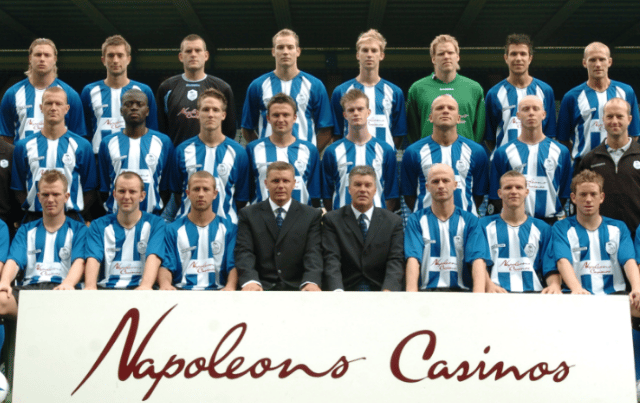

That was until the 77th minute of the play-off final. Stepping onto the field as he third wheel in Sturrock’s famous triple change he provided an energy and drive from defence and quickened-up Wednesday’s passing in possession at a time they needed it.
Though MacLean and Talbot would make headlines for their goalscoring efforts in the eventual 4-2 win at Cardiff, Collins’ was perhaps the thinking man’s impact sub and he left the field knowing he had contributed to a famous afternoon in the club’s rich history.
He’d also left the field with a badly sprained jaw he thought he’d broken, sustained after he was the first man to greet Talbot in celebrations that would end with goalkeeper David Lucas completing a team pile-on.
Advertisement
Hide AdAdvertisement
Hide AdCollins said: “Everybody was going crazy, but at the same time you have people like Steve MacLean who came on and scored, Bully who had led the team, but there were also people who either didn’t get on the pitch or who knew they might get released because of promotion essentially. You’re trying to be happy for others. There was celebration on the bus, the changing rooms, and the casino afterwards. It was non-stop.
“It was incredible to be a part of it, but in the back of your mind it’s a case of what next; are they signing new players, do I have a contract? The enjoyment was massive, it’s a highlight of your career, but if you’re one of the fringe players you wonder how it might impact you.
“It was bittersweet in a way. It was a really incredible celebration but you ask Bully, Hecky, Glenn, Chris, they were the core players who were celebrating going off to play in the Championship. The other players were thinking it could have been the last day they played for Sheffield Wednesday. You want to celebrate but the fans don’t see that side of it. You almost don’t feel a part of the celebrations. You’re happy for other people but maybe not so happy for yourself.”
It was perhaps clear to Collins even then. The day would prove to be the highlight of a career that at that stage should have only just started.
*****
Advertisement
Hide AdAdvertisement
Hide Ad“I have no regrets,” Collins says with an air of confident satisfaction. “It is incredible looking back at time at Sheffield Wednesday, with England, I had all these experiences and managed to take them into another world. I’m proud of what I did, I have England caps and photos and I’ll show them to my kids in the future. It’s not a case of a lost opportunity, it’s more appreciative of being able to have had that experience for a short period of time.”
Collins is speaking on Zoom from Lithuania at the age of just 38, some 18 years on from Cardiff and 15 years on from his decision to walk away from football at the age of just 23. It’s fair to say he’s done a fair bit since.


One of the players to have fallen the wrong side of a vast squad overhaul put in place as Wednesday moved from League One to the Championship, he started the season out of the side and made only two further appearances for the Owls - all of which were defeats.
He’d go out on loan to Swindon Town and did well before injuries curtailed his progress. There was talk of a possible contract extension at S6 as a fringe player, but his high standards and drive began to tell him football was a world he would never reach the highs of his teenage England recognition again. He spent two years closer to home with Darlington, including a short loan stint with Oxford United, when injuries began to close in.
Advertisement
Hide AdAdvertisement
Hide AdInjuries didn’t retire him, he says, he could have carried on and built a career. But in his early 20s, he decided enough was enough. He accepts fans reading this article will think him mad to pass up on what millions see as the dream career.
“If you look at the ages of 16 to 24, that’s a big chunk of your development time in your life as a person,” he said. “You have the experience of being a footballer and it’s amazing but at the same time you lose part of that development; school, uni, jobs, partners or whatever.
“I enjoyed the whole experience but I took it as a chance to go out and live in the real world. I found it as a relief, really, I wanted to be in control of my life rather than living in hope of impressing a manager. Because I’d had a taste of playing for England and seeing how the best perform, I felt that if I couldn’t emulate and get to that level, there were other directions I wanted to go out and push.
“I had a friend at Darlington who had 17 teams, young kids, moving around all the time. I have huge respect for the game and people who want to make that happen, but you’ve really got to want to do it. It just wasn’t the direction I wanted to go in. It was a fresh start and an opportunity to get going again.
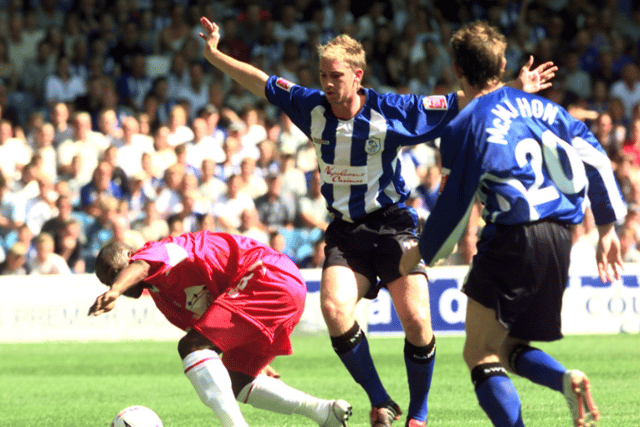

Advertisement
Hide AdAdvertisement
Hide Ad“A lot of people put it as their be-all and end-all. I enjoyed it so much, I did, but at the same time I really did struggle with not fitting in that world. If you were to speak to other players about me, they might say ‘Oh he was an oddball or a weirdo’ because in truth I never really clicked in terms of finding my place in a changing room.
“I absolutely gave it my all and I’m so proud of my achievements but it wasn’t a time that I look back on and think how much I loved that career. It was more a tough career that had wonderful experiences.
“People seem to be a bit more open now. At the time, there wasn’t much counselling, support or training in that sort of thing. I guess you just dealt with it. Now, there’s better ways in the game. I could have integrated into the city, I could have met more people.
“There’s much more effort made these days to settle players into a club or a city. The biggest regret was not really knowing people in Sheffield. I’d have loved to have gone to the pub and met some fans and done more.”
Advertisement
Hide AdAdvertisement
Hide AdA clever lad with a talent for football, Collins had been wise enough to invest his wages wisely, which gave him chance to take a breath and consider his next career. His brother ran an entertainment business based around street performance and the former footballer would sometimes find himself dressed as a robot at an event in Egypt for a few hours in an otherwise all-expenses paid holiday or performing at Glastonbury. If something came up, he’d give it a go. It was a laugh.
He’d developed a love for travel not always possible in football and considered coaching, for which he had obtained badges during his young career. But it became clear his passion was for business - and that he could use skill sets learned in football; preparation and mindset in particular.
An effective communicator, he found he could hold a room and that had an eye for improving start-up businesses. It is in that sphere that he now works as the founder of Prospect Labs, a company that helps new businesses grow. It’s a job he loves and that takes him all over Europe, to America and to Asia.
He has two kids and a Lithuanian wife he met while undertaking a language course in Newcastle. He’s lived there for six years and aside from the odd corporate kickabout and using his football career as a conversational ice-breaker, he thinks little about the game.
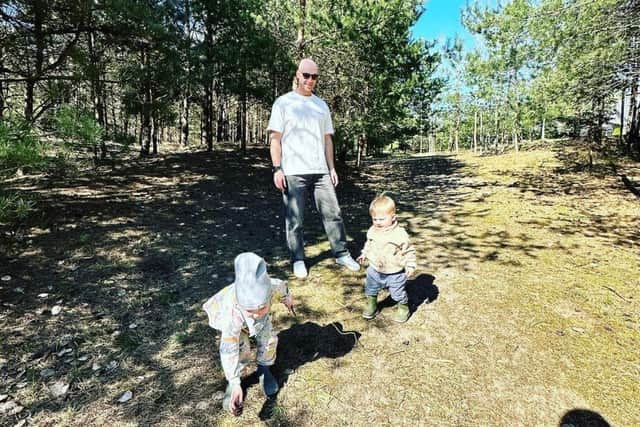

Advertisement
Hide AdAdvertisement
Hide Ad“They’ll be sporty I think,” he says of his two children - a boy and a girl. “But I certainly wouldn’t push them to be footballers, it’s more a case of having that opportunity if it comes. There is such pressure on people to have to do something they don’t necessarily want to do. I was lucky, I had a chance and went for it. Other players had parents driving them for 10 years.
“There were bits that were negative in my football career,” he continued. “And some real highs. In the end, it was that I had such ambition - be the very best or why bother?
“I think when I got to Sheffield Wednesday, the second season, I was looking at going out on loan or whatever. People might read this and think I’m crazy given I had the privilege to be a professional footballer, but I just didn’t feel I was in control of my life and career and I found that really difficult.
“If you’re a business owner, a CEO or whatever, it takes hard work and progression but you’ll get there. In football, no matter how hard you work you might not be that good. Maybe you plateau, or go down the leagues, maybe a manager doesn’t rate you. You’re not in control of your own life.
Advertisement
Hide AdAdvertisement
Hide Ad“For me, being someone quite ambitious, I wanted to do the best I could do. I got some injuries and spent so much time thinking about how I could still be the best I could be. It was tough. I enjoyed all the experiences of being a footballer, I tried to spend my money wisely and put some money in property, but I left without any regrets.
“People say I finished too early. I retired young, but I don’t have any regrets. I have had two good careers, football and what I do now. You get players who get to 36 or 37 and it’s a case of ‘Well what do I do now?’ You’re starting at the bottom and unless you’ve made mega-money you have to pick up a vocation. I felt I was in control of my life by retiring.”
Patrick Collins is unrecognisable from the young Sheffield Wednesday player that emerged from the bench to help change the 2005 League One play-off final.
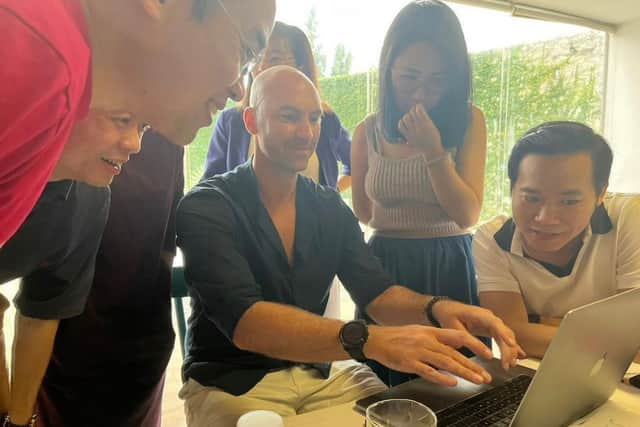

Signing off from the Zoom call, The Star reassures him that despite the themes covered, this article won’t paint him as a ‘cartoon posho’ or a changing room recluse.
Advertisement
Hide AdAdvertisement
Hide Ad“It wouldn’t be too far from the truth,” he laughs. “I think people need to know that there are different types of people in football. My experience was very different to most.”
With that he’s gone, the call ends and he joins another meeting. Football is very much a past life for the man who once captained Wayne Rooney.
His is a unique view of some of the most seminal days in Sheffield Wednesday’s modern history.
Patrick would love to hear from Wednesday supporters to discuss memories of his time at the club. Fans are invited to contact him via his Instagram page at https://www.instagram.com/patchrickcollins/.
Comment Guidelines
National World encourages reader discussion on our stories. User feedback, insights and back-and-forth exchanges add a rich layer of context to reporting. Please review our Community Guidelines before commenting.